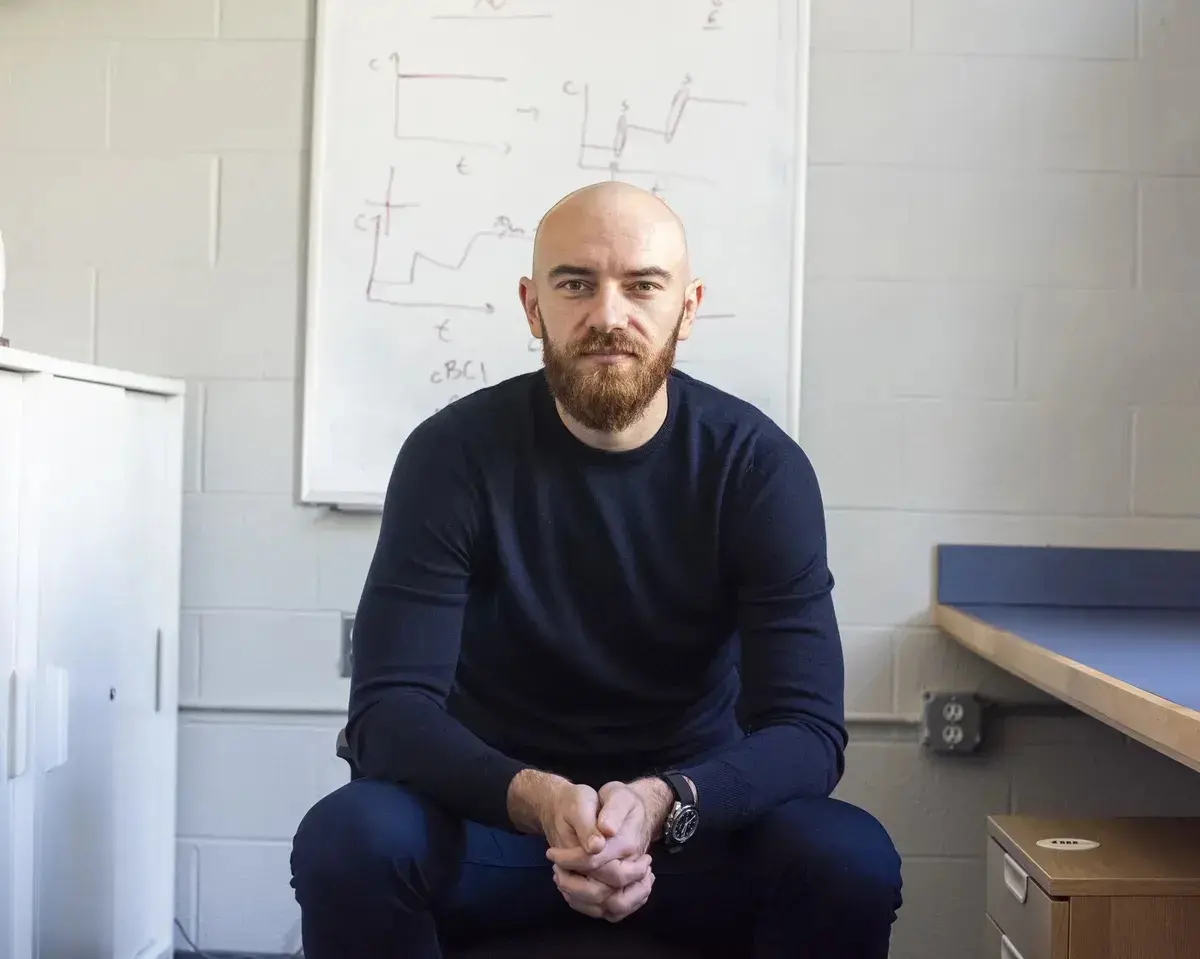Eight years ago, this crypto billionaire went all in on Ethereum. Why has he become fascinated with longevity science?
After achieving great success in investing in cryptocurrency, James Fickel quietly became one of the world's largest funders of longevity science and brain research.
Author: Ashlee Vance, Bloomberg
Compiled by: Luffy, Foresight News
In early April this year, James Fickel boarded a train from Boston to New Haven, Connecticut, to inspect a batch of animal (pig) brains. These brains were stored in rows of large barrels inside a building on the edge of the Yale University campus, connected to a tangle of tubes and several machines that delivered nutrient-rich liquid to the brains. Researchers have long dreamed of studying brains that can still function outside the body, and this device has turned that dream into reality.

James Fickel. Image source: Bloomberg Businessweek
A few years ago, the work of Croatian scientists Nenad Sestan and Zvonimir Vrselja opened the door to this avenue of brain research. In 2019, they announced that they had restored pig brain cell activity for up to four hours after slaughtering a pig at a meat processing plant, a revelation that made headlines across major media outlets. Since then, this scientific research has transformed from a research project into a startup called Bexorg Inc. The company hopes that their technology (also used for donated human brains) will allow for a deeper understanding of the biological principles of the brain, the development of better drugs, and possibly provide sci-fi-like restoration techniques for brains that have suffered trauma. As an early investor, Fickel has made significant contributions to this work.
Fickel's involvement with Bexorg was an unexpected experience. After a successful investment in cryptocurrency, he quietly became one of the world's largest funders of longevity science and advanced brain research. Fickel has invested over $200 million in various startups and university research labs, aiming to extend human healthspan while preparing for coexistence with artificial intelligence. He often invests alongside well-known, wealthy philanthropists like Bill Gates and Eric Schmidt. This is his first public discussion of his work in the field.

The refrigerator at the Bexorg research lab in New Haven stores canned pig brains. Image source: Bloomberg Businessweek
Fickel's unusual journey began in 2016 when the then 25-year-old invested all $400,000 he earned from software development and stock trading into the emerging cryptocurrency Ethereum. At that time, Ethereum was a little-known token trading at about 80 cents. Today, Ethereum has become one of the most recognized crypto assets, with a single token valued at over $3,000. This investment alone was enough to catapult Fickel into the ranks of billionaires.
Cryptocurrency billionaires are often known for their revelry in tax havens and chasing subsequent financial frenzies. Fickel's only previous appearance in mainstream media was in 2018 when The New York Times featured him in an article titled " Everyone is Getting Very Rich, Except You ." He was photographed with his cat Bigglesworth and described as an apostle of the populist digital currency movement. The article also recounted anecdotes of how Fickel's personal trainer made a fortune by following his trading advice.
Fickel has a keen sense of fashion and enjoys revelry occasionally, but he does not fit the mold of a typical cryptocurrency enthusiast. He is more inclined towards the intellectual aspects of cryptocurrency. He funded academic research on Ethereum price fluctuations, including a paper published in 2020 by Columbia University professor Timothy Roughgarden, a leading researcher in algorithmic game theory. This paper played a role in stabilizing Ethereum transaction fees and curbing Ethereum's inflationary trends.
When the COVID-19 pandemic broke out, Fickel suddenly grew tired of the cryptocurrency industry. Seeking a more comfortable place to ride out the pandemic and avoid state income taxes, he moved from San Francisco to Austin, Texas, in 2020. "I decided to be a monk for a while, and I read a lot of books," Fickel said, tall and lean, a self-described laid-back futurist. "I've been in the cryptocurrency industry for a long time, and now I need to think about something different."
In Texas, he read works by longevity experts like Nir Barzilai and Aubrey de Grey, then turned to more in-depth scientific texts, finding some seasoned researchers who seemed to believe that significant breakthroughs in longevity were imminent. This was more appealing than many cryptocurrency enthusiasts' new hobbies, like non-fungible tokens (NFTs), which Fickel found ridiculous. He decided to become an investor and philanthropist, starting to email startup founders to introduce himself and see if they would be willing to suggest how to allocate funds. Unsurprisingly, founders were thrilled to receive his emails.
By 2021, Fickel decided to formally dive into investing and philanthropy. (Translator's note: James Fickel remains an active cryptocurrency trading whale, with large transfers and trading activities frequently occurring in his on-chain wallet.) He founded the Amaranth Foundation and hired a young student, Alex Colville, who was then pursuing a Ph.D. in genetics at Stanford University, as his main investment partner. Together, they began interviewing dozens of researchers and startups and reading a vast number of papers. Although Fickel lacked an academic background, he learned quickly and was soon able to engage in deep conversations with scientists and assess whose work had the most potential.
In the first 18 months after Amaranth's establishment, Fickel's company invested $100 million, with 70% going to startups and the rest allocated to academic moonshot projects. Amaranth invested in about 30 companies and research groups in total. Fickel's early investments included Cellular Longevity Inc (which developed drugs to extend dogs' lifespans), Cyclarity Therapeutics Inc (which is researching therapies to reverse arterial plaque buildup and prevent heart disease), and LIfT BioSciences (which is developing new cells that can destroy cancerous tumors). Today, he is the largest supporter of age1, a venture capital fund focused on longevity science, co-founded by Colville and well-known investor Laura Deming.
For someone who made a fortune in cryptocurrency, Fickel has a high tolerance for risks that other investors might avoid, which is perhaps to be expected. His interest in Magic Lifescience, located in Mountain View, California, illustrates this. Founded in 2021, the company uses technology developed at Stanford University over the years to create a machine the size of a toaster that can diagnose multiple diseases using small samples of urine, saliva, and blood. The similarities to the notorious diagnostic startup Theranos have posed obvious funding challenges for the company. These challenges did not deter Fickel, who led Magic's first round of financing.
Initially, the Amaranth Foundation provided funding to those making meaningful contributions in the fields of Alzheimer's disease and mental health, then delved into brain science. In addition to Bexorg, Fickel also funded E11 Bio, an organization developing new brain mapping technologies, and Forest Neurotech, which manufactures brain implants that emit ultrasound pulses for studying the causes of mental health disorders and neurological diseases. The foundation's most recent investment was a $30 million contribution to a secret project at Stanford University called Enigma, which is building an ambitious model of brain structure and detailing how each neuron operates throughout the brain.
Fickel stated that his interest in the Enigma project partly lies in its potential to create a digital representation of the brain, which could help train artificial intelligence systems. Once people fully understand the mechanisms of the human brain, they could use that knowledge to digitally create an artificial brain, utilizing associated data and AI models to gain a more comprehensive understanding of how we think and how our values are deeply rooted. If fortunate, this could lead to safer integrations of humans and machines in the coming years. Fickel said, "When we shift capabilities in one dimension or another, we really don't know what is safe and what is unsafe. We need to figure out how to give AI similar values and representations as humans and bind the models to our capabilities until we figure out how to safely design more powerful thinking."

Zvonimir Vrselja sits in a lab at Yale University. Image source: Bloomberg Businessweek
Back at Bexorg, scientist Vrselja weaves between rows of barrels containing brains. Beside him are Fickel and Joanne Peng, who became Amaranth's new chief of staff after Colville moved to manage age1. At 24, Peng is another biotech prodigy who took two years off to pursue the Thiel Fellowship. While completing her studies at Princeton University, Peng helps Fickel invest his substantial wealth.
Vrselja tries to showcase all the progress the startup has made since Fickel's last visit a year ago. "Everything you see—code, hardware, software, liquid, everything—is made by us," he says. This technology is expected to provide a new way to test compounds and their effects on the brain by offering alternatives to human trials for pharmaceutical and biotech companies. Currently, the only way to involve humans in drug testing is through years of animal trials, which are costly and arduous even then. "Developing drugs is hard, and developing brain drugs is even harder," Vrselja says.

Bexorg's custom blood substitute. Image source: Bloomberg Businessweek
However, with Bexorg's system, brains affected by diseases like Alzheimer's and Parkinson's seem to maintain some functionality. The company states that while cellular activity in these brains continues, the neurons have stopped firing, so they have no consciousness. This is certainly different from clinical trials, but the hope is that early testing on brains will save time and money by making it easier to identify which avenues are worth exploring early in the drug development process.
"I'm not a physicist or a neuroscientist," Fickel said when discussing his investment philosophy, "what I'm trying to do is build a higher-level mental model with these top scientists and then push for the world changes I want to see."
Disclaimer: The content of this article solely reflects the author's opinion and does not represent the platform in any capacity. This article is not intended to serve as a reference for making investment decisions.
You may also like
Shiba Inu holders show resilience amid market volatility

Institutional investors buy Bitcoin despite market volatility

Crypto market mirrors stock declines amid recession fears

EU may fine Elon Musk's X $1 billion for DSA violations

